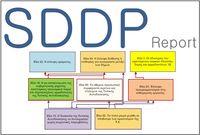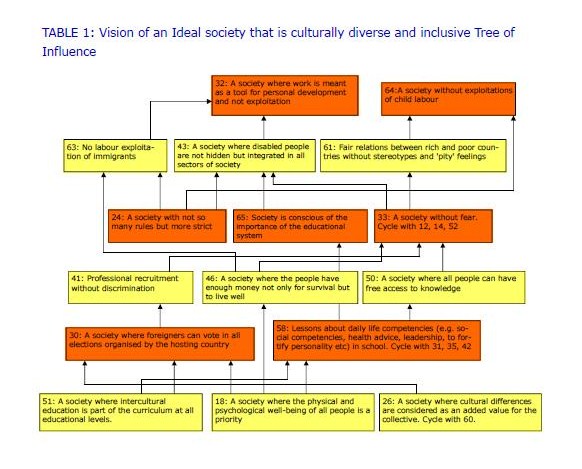SDDP UCYVROK Italy - Obstacles: Difference between revisions
(Created page with "{{SDD_Report <!-- The name of the template --> |acronym=SDDP Uniting for Citizenship and participation- Obstacles ...") |
(change of template) |
||
| (32 intermediate revisions by 4 users not shown) | |||
| Line 1: | Line 1: | ||
{{SDD_Report | {{SDD_Report | ||
|acronym=SDDP | |acronym= SDDP ‘Uniting for Citizenship and Participation: Youth promoting Vulnerable Groups’ Rights,Opportunities and Knowledge | ||
|book_image=SDDP_Report_Image.jpg | |book_image=SDDP_Report_Image.jpg | ||
|report_title= Youth promoting Vulnerable Groups’ Rights,Opportunities and Knowledge. | |||
|Triggering_Question=What are | |project= [[UCYVROK - Uniting for Citizenship and Participation]] | ||
|Triggering_Question= What are descriptors of an ideal society that is culturally diverse and inclusive? | |||
|location= Pisa, Italy | |||
|dates= 04-05 JUL, 2008 | |||
|LeadFacilitator=[[Larry Fergeson]] <br>[[Kerstin Wittig]]<br> [[Yiannis Laouris]] | |||
|AsFacilitator= | |||
|author= [[Larry Fergeson]] <br>[[Kerstin Wittig]]<br> [[Yiannis Laouris]] | |||
|editor= | |||
|total_duration= 121.95 person hrs | |||
|stats= Participants=9 <br> Number of ideas=65 <br>Number of Clusters=8 <br> Ideas received Votes=23 <br> Ideas on MAP R=22 | |||
|isbn= | |||
|link= [http://www.box.net/shared/q4voy8edeb#UCYVROK_SDDP_Italy_Final_LF Italy Final Report] | |||
}} | }} | ||
==Executive Summary== | ==Executive Summary== | ||
<br> | |||
This interactive workshop based on the Structured Dialogic Design Process (SDDP) was organised | |||
as part of the project [[UCYVROK - Uniting for Citizenship and Participation|“Uniting for Citizenship and participation: Youth promoting Vulnerable group’s Rights, Opportunities and Knowledge (UCYVROK)”]].The main aim of this project is to inform and | |||
mobilise young individuals from less privileged groups and actively promote youth citizenship. The | |||
project also aims at promoting feelings of solidarity, communication and understanding among | |||
youths of Europe and together work towards promoting European cooperation. The project engages | |||
stakeholders to exchange expertise and share best practices of youth organisations working on issues | |||
of cultural diversity, human rights, inclusion, empowerment and active citizenship. The main | |||
goal is to develop a joint vision of European Youth based on generally abiding principles of human | |||
rights, inclusion and cultural diversity. The project team will also develop a Joint Action Plan encouraging | |||
increased participation of less privileged youth in European led activities. | |||
<br> | |||
<u>The [[Triggering Question]] (TQ) was: </u><br> | |||
'''What are descriptors of an ideal society that is culturally diverse and inclusive?'''<br> | |||
In response to the TQ, the 9 participants came up with 65 characteristics, which were categorized in 8 clusters. Following the voting process, 23 ideas received one or more votes and were structured to create the influence MAP shown below. <br> | |||
[[File:UCYVROK_Italy.jpg|thumb|center|upright=3.0|alt=MAP for UCYVROK Italy workshop.|Influence tree from the Characteristics SDDP of the UCYVROK Italy TQ1.]] | |||
<br> | |||
According to the participants of this workshop, appear to be the most influential were: <br> | |||
* Characteristic #51,A society where intercultural education is part of the curriculum at all educational levels. | |||
* Characteristic #18,A society where the physical and psychological well-being of all people is a priority. | |||
* Characteristic #26,A society where cultural differences are considered as an added value for the collective.Cycle with 60. | |||
<br> | |||
<br> | |||
The workshop was facilitated by [[Yiannis Laouris]], [[Kerstin Wittig]], and [[Larry Fergeson]]. The workshop was attended by 9 participants from Italy, France, Greece, Germany and Cyprus. In sum, the participants of the dialogue reported their satisfaction that their voices have been heard and documented and communicated their expectations for follow-up activities to address the diagnosis of their needs. | |||
==Sponsor and partners== | |||
The project Uniting for Citizenship and Participation: Youth promoting Vulnerable Groups, Rights, | |||
Opportunities and Knowledge (UCYVROK) was co-funded by the '''European Union''', [[Youth in Action]] Programme. | |||
The coordinating organisation of this project is the [[Future Worlds Center]]. <br> | |||
The project’s partner organisations are: | |||
*[[ANTIGONE]] (Information Centre on Racism, Ecology, Peace and Non Violence, Greece), | |||
*[[CVC]] (Centrum voľného času, Slovakia), | |||
*[[ANEEI]] (Agency for Non-formal Education and European Information, Bulgaria), | |||
*[[ADICE]] (Association pour le Développement des Initiatives Citoyennes et Européennes, France), | |||
*[[Universitá del terzo Settore]], (Italy), | |||
*[[Intercultural Institute of Timisoara]] (Romania), | |||
*[[Salesian Missionary Voluntary Service]](Youth for the World, Poland), | |||
*[[Association ‘Youth for Society’]] (Latvia), | |||
*[[Multikultúra Egyesület]] (Hungary), | |||
*[[Jugend bewegt Europa]] (Germany) | |||
*[[Human Rights Education Youth Network]] (HREYN—European Network, Spain) | |||
==External Links== | ==External Links== | ||
* [http://www.] | * [http://ucyvrok.wetpaint.com/ UCYVROK Website] | ||
* [http://www.box.net/shared/z3qefs9qtu#UCYVROK_SDDP_Italy_Final_LF Download Italy Final Report] | |||
==References== | ==References== | ||
| Line 29: | Line 78: | ||
[[Category:SDDP (Youth)]] | [[Category:SDDP (Youth)]] | ||
[[Category:SDDP (UCYVROK)]] | [[Category:SDDP (UCYVROK)]] | ||
[[Category: SDDP Reports]] | |||
Latest revision as of 03:41, 25 July 2022
|
Executive Summary
This interactive workshop based on the Structured Dialogic Design Process (SDDP) was organised
as part of the project “Uniting for Citizenship and participation: Youth promoting Vulnerable group’s Rights, Opportunities and Knowledge (UCYVROK)”.The main aim of this project is to inform and
mobilise young individuals from less privileged groups and actively promote youth citizenship. The
project also aims at promoting feelings of solidarity, communication and understanding among
youths of Europe and together work towards promoting European cooperation. The project engages
stakeholders to exchange expertise and share best practices of youth organisations working on issues
of cultural diversity, human rights, inclusion, empowerment and active citizenship. The main
goal is to develop a joint vision of European Youth based on generally abiding principles of human
rights, inclusion and cultural diversity. The project team will also develop a Joint Action Plan encouraging
increased participation of less privileged youth in European led activities.
The Triggering Question (TQ) was:
What are descriptors of an ideal society that is culturally diverse and inclusive?
In response to the TQ, the 9 participants came up with 65 characteristics, which were categorized in 8 clusters. Following the voting process, 23 ideas received one or more votes and were structured to create the influence MAP shown below.
According to the participants of this workshop, appear to be the most influential were:
- Characteristic #51,A society where intercultural education is part of the curriculum at all educational levels.
- Characteristic #18,A society where the physical and psychological well-being of all people is a priority.
- Characteristic #26,A society where cultural differences are considered as an added value for the collective.Cycle with 60.
The workshop was facilitated by Yiannis Laouris, Kerstin Wittig, and Larry Fergeson. The workshop was attended by 9 participants from Italy, France, Greece, Germany and Cyprus. In sum, the participants of the dialogue reported their satisfaction that their voices have been heard and documented and communicated their expectations for follow-up activities to address the diagnosis of their needs.
Sponsor and partners
The project Uniting for Citizenship and Participation: Youth promoting Vulnerable Groups, Rights,
Opportunities and Knowledge (UCYVROK) was co-funded by the European Union, Youth in Action Programme.
The coordinating organisation of this project is the Future Worlds Center.
The project’s partner organisations are:
- ANTIGONE (Information Centre on Racism, Ecology, Peace and Non Violence, Greece),
- CVC (Centrum voľného času, Slovakia),
- ANEEI (Agency for Non-formal Education and European Information, Bulgaria),
- ADICE (Association pour le Développement des Initiatives Citoyennes et Européennes, France),
- Universitá del terzo Settore, (Italy),
- Intercultural Institute of Timisoara (Romania),
- Salesian Missionary Voluntary Service(Youth for the World, Poland),
- Association ‘Youth for Society’ (Latvia),
- Multikultúra Egyesület (Hungary),
- Jugend bewegt Europa (Germany)
- Human Rights Education Youth Network (HREYN—European Network, Spain)

